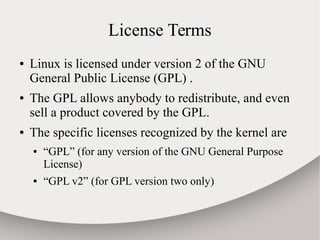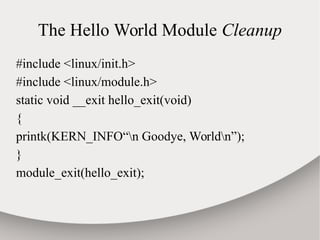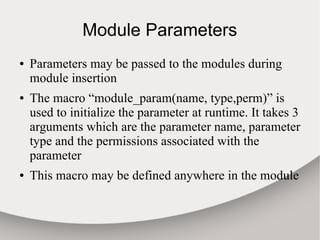Linux kernel code
- 2. Module Programming ● Module Initialization ● Module Cleanup ● Compiling and Loading a module ● The Makefile ● Module Parameters ● Kernel Symbol Table
- 3. What are modules ? ● Simple pieces of C code. ● Each piece of code that can be added to the kernel at runtime is called module. ● No main() function like normal C programs. ● Module Initialization and Cleanup ● Mechanisms of registering and De-registering with the kernel.
- 4. Module Initialization ● A module always begin with the function you define with module_init( ). ● module_init(): ● This is the entry point for the module. ● It tells the kernel what functionality module provides. ● Once it's done, module remains in kernel waiting to be called. ● Calls are executed by user space application.
- 5. Module Cleanup ● A module ends by calling module_exit() function. ● module_exit(): ● Exit point for module. ● It will undo whatever initialization function performed. ● It unregisters the module from kernel. ● It returns all resources to the system.
- 6. Functions in Modules ● Standard C library functions cannot be used in module programming. ● Functions/Variables shared between modules have to be exported as kernel symbols into global space. ● To see the symbols exported into the kernel “cat /proc/kallsyms“ ● If symbol is not found, module will not be loaded to kernel and return back with an error.
- 7. Important MACRO'S ● module_init (<name for your init function>) ● module_exit (<name for your exit function>) ● Whatever name is passed to the above macros should be defined as the name of the init and exit functions. ● MODULE_LICENSE(“GPL”) ● Without this kernel gives warning message of “kernel tainted”.
- 8. License Terms ● Linux is licensed under version 2 of the GNU General Public License (GPL) . ● The GPL allows anybody to redistribute, and even sell a product covered by the GPL. ● The specific licenses recognized by the kernel are ● “GPL” (for any version of the GNU General Purpose License) ● “GPL v2” (for GPL version two only)
- 9. The Hello World Module Initialization #include <linux/init.h> #include <linux/module.h> static int __init hello_init(void) { printk(KERN_INFO“n Hello, Worldn”); return 0; } module_init(hello_init);
- 10. The Hello World Module Cleanup #include <linux/init.h> #include <linux/module.h> static void __exit hello_exit(void) { printk(KERN_INFO“n Goodye, Worldn”); } module_exit(hello_exit);
- 11. The Makefile ● Makefile is a file that describes the dependencies among files in your program and provides commands for updating each file. ● Once a suitable Makefile exists, each time you change some source files, this simple shell command: – make suffices to perform all necessary recompilations.
- 12. Makefile obj-m := hello.o KERN_SRC := /lib/modules/$(shell uname -r)/build PWD := $(shell pwd) modules: make –C $(KERN_SRC) M=$(PWD) modules modules_install: make –C $(KERN_SRC) M=$(PWD) modules_install Clean: make –C $(KERN_SRC) M=$(PWD) clean
- 13. Compiling the Module linux:~ $ make linux:~ $ sudo insmod hello.ko linux:~ $ dmesg linux:~ $ lsmod linux:~ $ sudo rmmod hello linux:~ $ dmesg
- 14. Module Parameters ● Parameters may be passed to the modules during module insertion ● The macro “module_param(name, type,perm)” is used to initialize the parameter at runtime. It takes 3 arguments which are the parameter name, parameter type and the permissions associated with the parameter ● This macro may be defined anywhere in the module
- 15. The Kernel Symbol Table ● Global Kernel Space ● Modules can export services to other modules through the use of kernel macros “EXPORT_SYMBOL(name)” which takes the name of the parameter or function as argument. ● This exported function may be used by other modules in requirement of similar functionality as done by the exported function.
- 16. Modprobe ● Modprobe is a cleverer version of insmod. ● It inserts dependent modules after examining the contents of /lib/modules/X.Y.Z/modules.dep ● modules.dep is created by a utility callled depmod. ● Depmod creates a Makefile-like depency file based on symbols contained in the modules.
- 17. Insmod vs Modprobe ● modprobe works in similar way as that of insmod, but it also loads any other modules that are required by the module you want to load. ● If your module depends upon three more modules, you have to do insmod three times plus once for loading that module itself ● But with modprobe, one single time is enough. It solves the dependency and loads the modules which are required.
- 18. Precautions for Kernel Programming ● Do not use Infinite/never ending loops. ● We should avoid floating point numbers. ● Stack size is limited to 4KB. ● We don't have access to the libraries (user space).


















